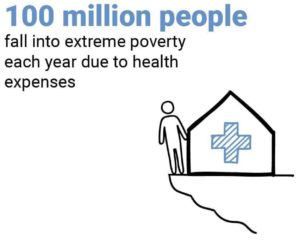[av_textblock size=” av-medium-font-size=” av-small-font-size=” av-mini-font-size=” font_color=” color=” id=” custom_class=” template_class=” av_uid=’av-liuhnano’ sc_version=’1.0′ admin_preview_bg=’rgb(255, 255, 255)’]
Listen up, folks! We need to have a serious conversation about the state of healthcare in under-served and under-resourced communities. It’s time to stop making excuses and start taking action. We need to go the last mile to move people from the back of the line and provide quality healthcare services to everyone, regardless of their background or circumstances.
Let’s face it: the healthcare system is failing under-served and under-resourced communities. According to the World Health Organization, at least half of the world’s population still lacks full coverage of essential health services. And in the United States, 28.5 million people under the age of 65 were uninsured in 2019, with low-income individuals being the most likely to lack health insurance coverage. That’s not acceptable.
We can’t keep blaming the lack of infrastructure for the healthcare disparities that exist in these communities. We need to invest in infrastructure and provide incentives for healthcare professionals to work in these communities. We need to break down the barriers that prevent people from accessing quality healthcare services.

But it’s not just about infrastructure. We need to be culturally competent. We can’t keep ignoring the cultural needs of both communities. We need to provide interpreters and translators, and train healthcare professionals to be aware of cultural differences in health beliefs and practices. And let’s not forget that community members themselves can be involved in the process. We need to listen to them and work with them to provide the care they need.
And let’s not kid ourselves, treating the symptoms is not enough. We need to address the root causes of health disparities. Poverty, discrimination, and social determinants of health are real issues that need to be tackled head-on. We need to create more equitable societies where everyone has access to the resources they need to live healthy lives.
So, what’s the bottom line? It’s time to take a look in the mirror. We need to break the rules and push the boundaries. We need to challenge the status quo and demand change. We need to move people from the back of the line and make sure that everyone has access to quality healthcare services.
We can’t afford to wait any longer. The time for action is now. We need to go the last mile and provide healthcare services to under-served and under-resourced communities. It’s not going to be easy, but it’s necessary. We need to work together to create a better future for all of us.
In conclusion, we need to disrupt the healthcare system to move under-served and under-resourced communities to the front of the line. We need to invest in infrastructure, be culturally competent, and address the root causes of health disparities. The statistics don’t lie. We have a long way to go, but we can make a difference if we work together. Let’s roll up our sleeves and get to work.
Go out and follow OFFOR Health and our CEO, Shawn Nason on LinkedIn.
[/av_textblock]
